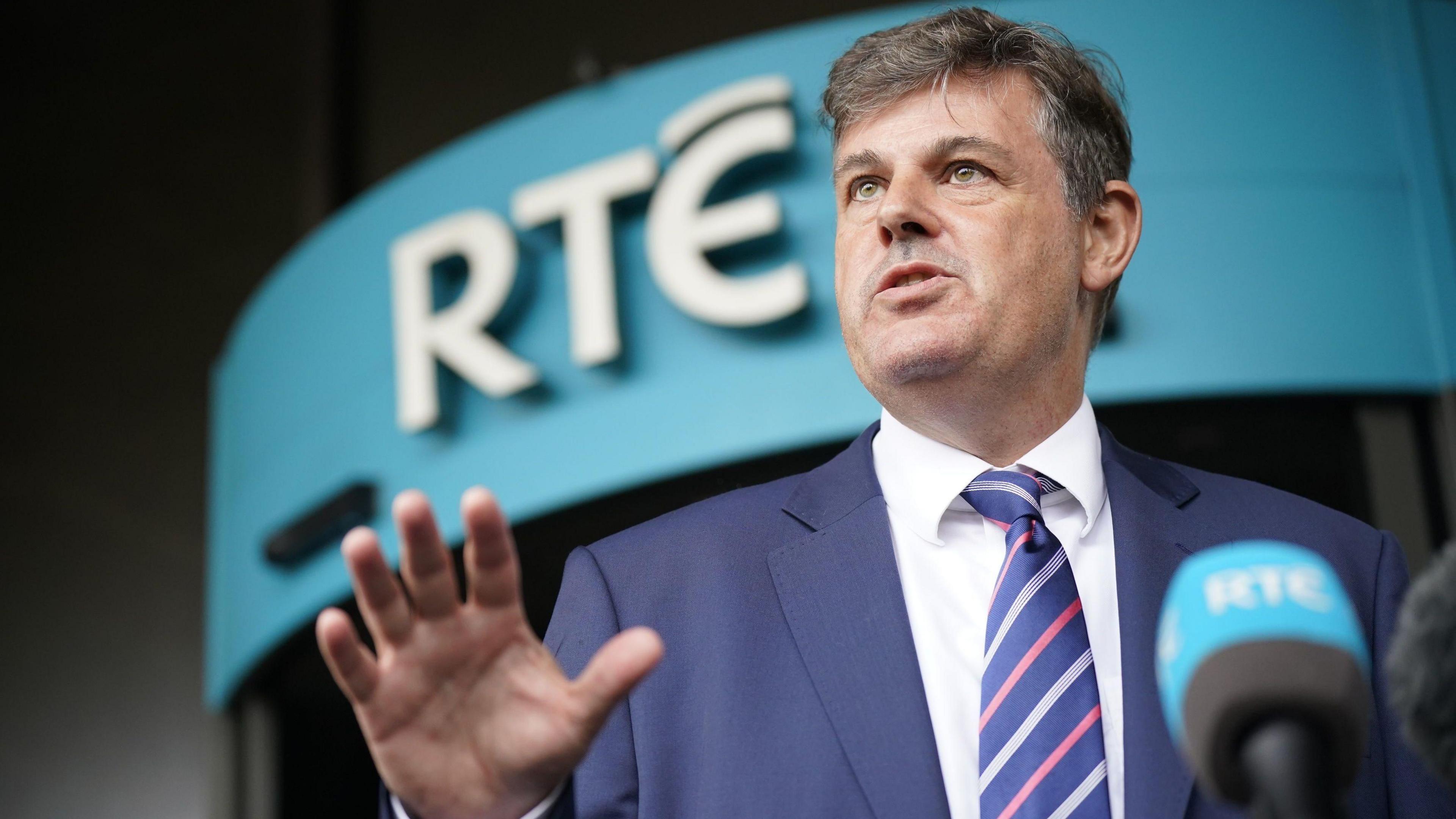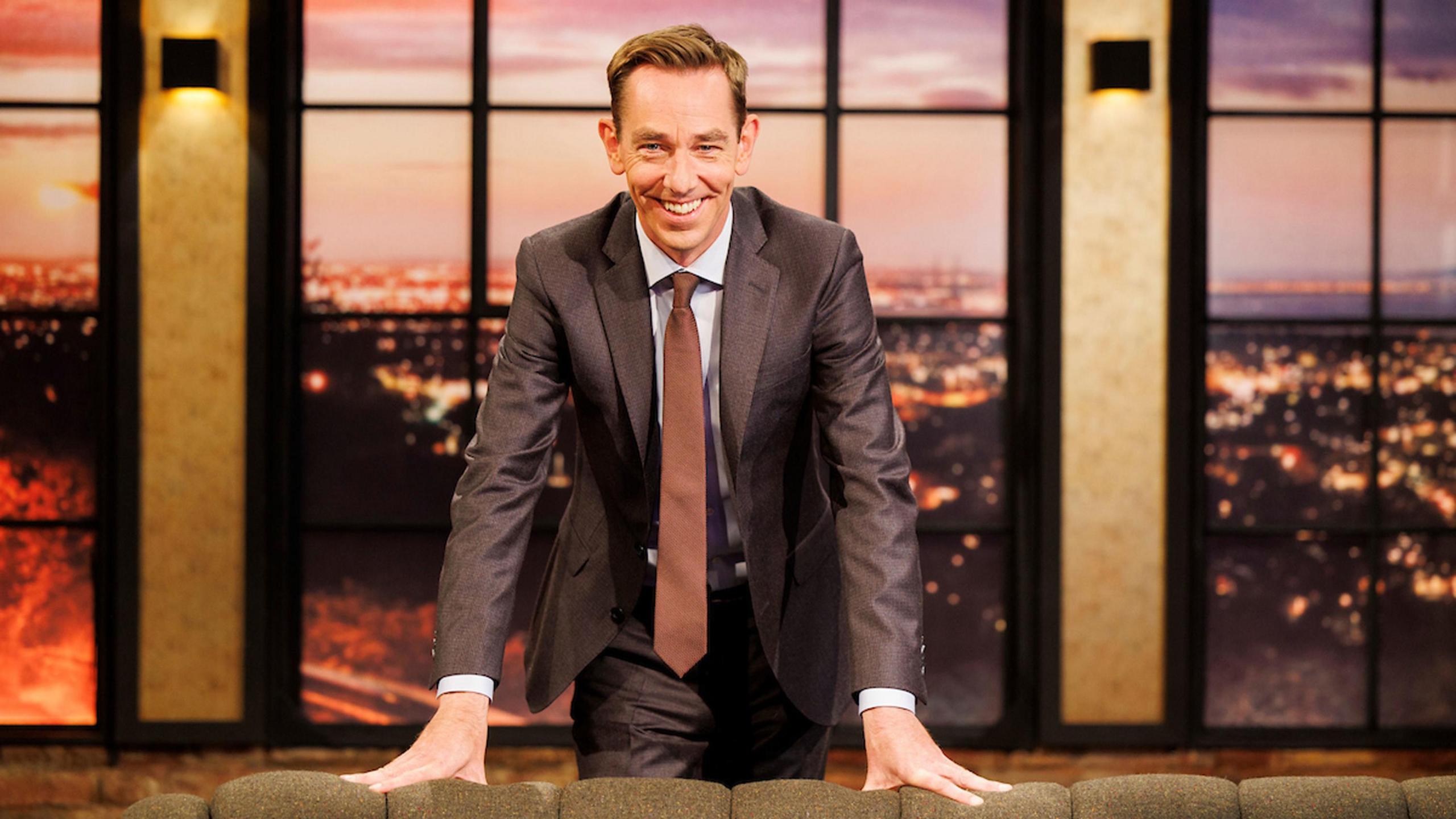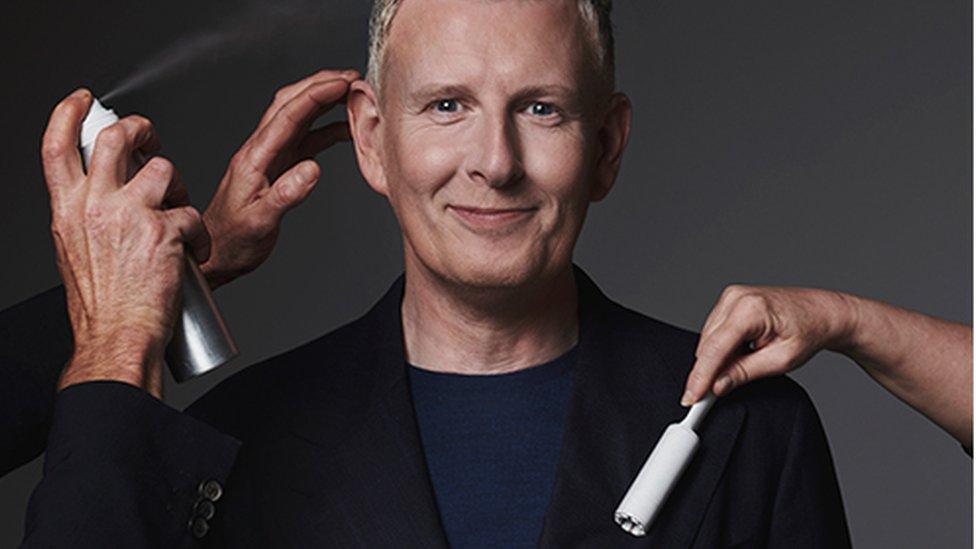RTÉ not facing bankruptcy, director general says

Kevin Bakhurst announced the changes in an email to staff on Wednesday
At a glance
RTÉ's director general Kevin Bakhurst has announced a recruitment freeze
All discretionary spending will also be stopped
The move is aimed at restoring public trust and confidence in the Irish public broadcaster
RTÉ has faced criticism in recent months over undisclosed payments made to former Late Late Show presenter Ryan Tubridy
Mr Bakhurst and RTÉ senior executives are facing questions from politicians over its spending
- Published
RTÉ's director general Kevin Bakhurst has announced the Irish broadcaster is in a challenging financial situation, but is not facing bankruptcy.
Mr Bakhurst said the broadcaster was starting a recruitment freeze with immediate effect.
In an all-staff email sent on Wednesday morning, Mr Bakhurst added that all discretionary spending will also be stopped.
It is part of moves to restore confidence in the public service broadcaster after controversial payments made to one of its star presenters, Ryan Tubridy, were made public in June.
Mr Bakhurst said he "regrets" the change as it will affect RTÉ's coverage and investment for the future.
"Given the steep fall in the licence fee and the uncertainty over interim funding, it is the only responsible thing that we can do," he said.
RTÉ is funded using advertising revenue as well as a TV licence fee.
Mr Bakhurst warned an Irish parliamentary committee on Wednesday that failure to implement a new longer term funding model for public service media in Ireland would jeopardise the future of RTÉ.
Mr Bakhurst has been at the helm of the organisation since July, taking over from former director general Dee Forbes.
She resigned over the controversial payment scandal just weeks before Mr Bakhurst was due to take over.
Explainer: What is happening at Irish broadcaster RTÉ?
Mr Bakhurst and members of the RTÉ board are facing further questions from politicians over the organisation's finances.
The broadcaster had previously asked the Irish government for €34.5m (£29.7m) in additional interim funding before the scandal broke.
It is projecting a loss of €21m (£18m) in revenue by the end of 2023 after a fall in TV licence payments.
The board's chair, Siún Ní Raghallaigh, told members of the Oireachtas (Irish parliament) media committee the broadcaster is under "immense pressure across a number of fronts."
She said a strategic review of the organisation will be completed soon, which will "then shape what will be a costed restructuring plan".
Speaking at the committee, Mr Bakhurst said taking real and radical change in the organisation is a "critical moment for public service media".
"We have a choice: we can work together to reform and reshape RTÉ for the next 100 years, or we can accept its failure and demise," he said.
"The latter is something that I, and I believe you, cannot accept."
Drinks over licence fee
When asked whether the broadcaster's premises in Donnybrook in Dublin could be sold to make up for lost revenue, Mr Bakhurst said all options were on the table.
He added that the site is currently being valued.
The director general said he was "sickened" by a 10% pay rise given to RTÉ executives in 2022.
He said he did not understand why the raise was not conveyed to the Irish government at the time and said it would not happen again.
Mr Bakhurst also said he found it “shocking” that RTÉ had paid for a membership for Soho House, a private members' club in London.
A TD (Irish MP) told RTÉ executives he would rather go to his local bar "and buy a round of drinks" than pay his TV licence fee.
"At least I'd know where my money went, I'd get more cultural content and more straight-talking from people," the Fine Gael TD Brendan Griffin said.
However, Mr Griffin later clarified that he would be renewing his licence fee and would encourage everyone else to do it.
I became the face of a national scandal - Tubridy
- Published11 July 2023
Why did RTÉ spend €12k on Springsteen tickets?
- Published13 July 2023
RTÉ made it seem Tubridy's salary below €500k
- Published16 August 2023
What's been happening at RTÉ?
The broadcaster has been at the centre of a scandal over undisclosed payments made to former Late Late Show presenter Ryan Tubridy.
An audit of RTÉ's finances found Mr Tubridy was paid €345,000 (£296,800) more than was declared publicly between 2017 and 2022.
Some of these undisclosed payments were made through a UK-based "barter account", in which advertising space is offered in exchanged for goods and services.
However, it is not exactly clear how the payments were made.
During an Irish government committee hearing earlier in the summer, RTÉ clarified it had three barter accounts, which had been used to pay for things like Bruce Springsteen tickets and flip-flops.
A report from accountancy firm Grant Thornton found the broadcaster had adjusted Mr Tubridy's publicly declared salary, making it seem he earned less than €500,000 (£428,000).
In August, Mr Bakhurst announced Mr Tubridy, who had been off-air since the payments were made public on 22 June, would not return to present his weekday radio show.
On Wednesday, Mr Bakhurst said there was no plan agreed for Mr Tubridy to repay €150,000 (£129,000) he had been paid in advance by RTÉ for future personal appearances with a commercial partner.
"I asked him about that money," he added.
"I said in the previous committee I appeared in that I thought (while) we don't have a legal mechanism to get it back, because it was agreed by RTE, but I think there's a moral case there."
Grant Thornton is carrying out a review of spending on Toy Show The Musical.
That is one of a number of investigations and reviews in RTÉ following the controversy of the payments to Mr Tubridy.
Related topics
- Published22 June 2023

- Published10 July 2023

- Published11 September 2023
